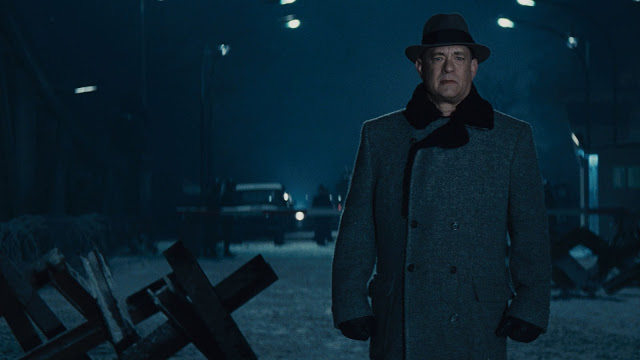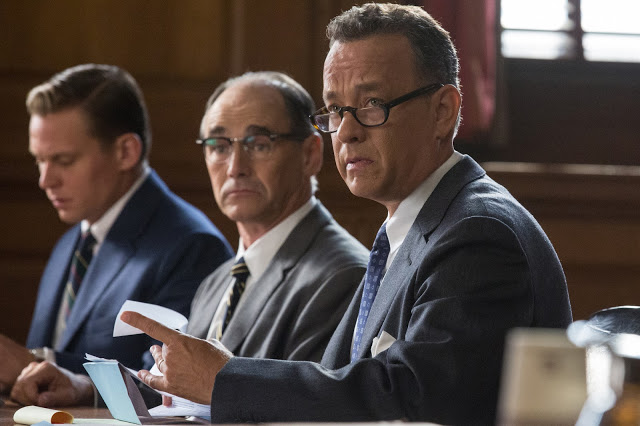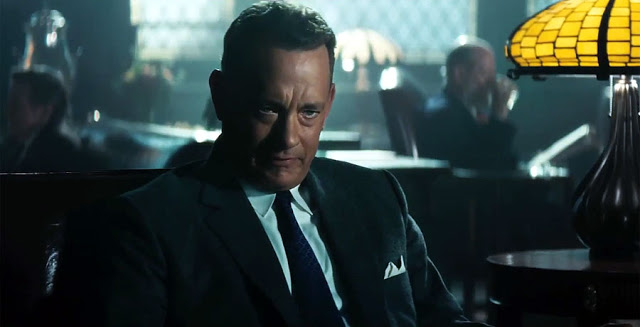The protagonist of Bridge of Spies, Steven Spielberg’s sage, supremely enjoyable Cold War thriller, doesn’t much look like a hero. With his graying hair and natty wardrobe, his appearance suggests a man more comfortable on the golf course than the battlefield. He doesn’t act like a hero either, not in the strictest sense of action; he never picks up a gun, and he spends half the movie sniffling, complaining about his cold. “I just want to go home and go to bed,” he says, more than once. These are not words you expect to hear from the hero of a spy flick. But even if James B. Donovan is not the square-jawed archetype who anchors most war pictures, he is a profoundly heroic character, effortlessly earning your admiration even as he’s quietly lifting your spirits. And Bridge of Spies itself is a sly, delightful piece of Spielbergian misdirection. Through the careful application of his typical late-period formula—namely, the combination of superb technique and wistful patriotism—Spielberg makes you feel, watching this film, as though you’re bearing witness to something grand. The trick is that you are, even if you’re also just listening to people talk.
Talk was the name of the game in the Cold War, a decades-long battle of bluster and braggadocio. Bridge of Spies instantly plugs into that atmosphere of boiling tension—the sense of constant threat, followed by perpetual inaction—during its brilliant, wordless opening sequence. A Brooklyn man picks up a ringing phone, listens impassively, then heads to the subway. A pair of FBI agents (including The Wire‘s Domenick Lombardozzi) cautiously tail him, then lose him, and then, in their frantic search to relocate him, literally run smack into him on a staircase. That was close! But in addition to serving as a wry piece of anticlimax, this non-chase sets the stage for the mounting anxiousness and fakery to come.
The agents’ quarry is Rudolf Abel (Mark Rylance, an English stage actor set to star as the title character next year in Spielberg’s The BFG), a wizened, solitary man suspected of being a Soviet spy. Actually, forget “suspected”—a quick, warrantless search of Abel’s hotel room produces “overwhelming” evidence of his KGB-sanctioned espionage, and once he refuses to cooperate with the U.S. government, a guilty verdict is assured. Still, the niceties must be observed, and the court thus appoints a lawyer to represent Abel. Enter Donovan (Tom Hanks, in a wonderful, beautifully understated performance), a successful insurance attorney who, when he learns of the appointment, seems less honored than dumbfounded. “Why me?” he wonders, to which the justice system essentially responds, “Why not?”
The legal farce that follows would be humorous if it weren’t so troubling. Donovan, respecting the solemnity of his task, mounts an aggressive (and not entirely specious) defense, only to be met with derision and injustice at every turn. He invokes attorney-client privilege, and a CIA agent stares at him in disbelief. He asks for a continuance, and a judge exasperatedly waves him off. He argues that evidence was seized without a warrant, and the judge growls about his patriotism. Donovan gradually comes to understand—though he never accepts—that his representation of Abel is a mere contrivance, a façade of procedural compliance while the government imposes its will from behind the curtain. Abel’s trial is a twisted spectacle that, in a fractured sense, recalls Jim Broadbent’s great line from Gangs of New York: “The appearance of the law must be upheld, especially while it’s being broken.”
This is, of course, outrageous, but there is an undercurrent of stealthy pedagogy running through Spielberg’s brisk plotting and canny editing. (Needless to say, certain events have been compressed for dramatic purposes, a virtual requirement for any good piece of historical fiction.) His previous film, the terrific Lincoln, used a seismic historical event as the scaffolding for a playful but pointed examination of America’s political process. Here, he turns his penetrating eye to the judiciary, and as vibrantly entertaining as Bridge of Spies is, it doubles as a stirring hymn to the sanctity of due process. This movie may chronicle events more than half a century old, but in our modern era of surveillance and suspicion, its message is remarkably urgent.
But do not mistake Bridge of Spies for a dry civics lesson. It is, first and foremost, a thumping blast of genre excitement, even if its thrills are cerebral rather than visceral. To prevent viewers from getting antsy, Spielberg intersperses Abel’s sober legal proceedings with scenes at a CIA training facility, where a gruff spook (Michael Gaston, from The Leftovers) is recruiting Air Force pilots to fly dangerous reconnaissance missions over Russia. These gung-ho flyboys include Joe Murphy (the rapidly rising Jesse Plemons) and, more importantly, Francis Gary Powers (Austin Stowell, the jock from Whiplash). In a brawnier, more virile film, Powers, with his matinee-idol looks and gum-chewing swagger, might have been the star. Here, however, he’s a mere plot point. In the movie’s most kinetic sequence, he gets shot down and captured, a disastrous result for the United States’ geopolitical standing, given Powers’ knowledge of CIA secrets. The Americans badly need him back. If only they were currently holding a Soviet spy whom they might be willing to trade…
Roughly midway through its runtime, Bridge of Spies seamlessly transitions from a contemplative legal drama into a sleek, invigorating hostage thriller. Donovan, ever the loyal servant, plunges into East Berlin, where he finds himself parrying words with a KGB minister (Mikhail Gorevoy), as well as a Stasi-employed lawyer (Sebastian Koch, currently complicating Carrie Matheson’s life on Homeland). During these chatty scenes, the movie reveals itself to be not just splendidly made but also beautifully written. The script, originally by Matt Charman and then doctored by the Coen Brothers, pulses with wit and intelligence. Some scenes are spoken entirely in German, much of which is boldly unsubtitled (recalling the restaurant scene in The Godfather); when Donovan parleys with a gang of Berlin toughs who demand his overcoat, the frame crackles with the omnipresent threat of violence.
As lovingly textured as Bridge of Spies feels, it is a bit thin from a character perspective. Outside of Donovan, we never really learn about any of the people we meet. Powers is a blank slate, as is Frederic Pryor (Will Rogers), an American expat who unwittingly becomes a crucial cog in the trade talks. On the home front, Amy Ryan has a thankless part as Donovan’s fretful wife, and while the screenplay hints at a bungled romance between Donovan’s assistant (Billy Magnussen) and his daughter (The Knick‘s Eve Hewson), nothing of consequence ever develops. Abel is far more intriguing—his quiet musings with Donovan have a charge of playful, macabre humor (in the film’s most amusing runner, Donovan repeatedly asks Abel why he doesn’t seem worried about his fate, to which his client stoically responds, “Would it help?”)—but he is still a cipher, a projection of unyielding loyalty.
Even so, Bridge of Spies remains furiously compelling, thanks in large part to Spielberg’s unfussy, supple technique. As with Lincoln, this is not a showy film, but every frame still glows, the product of unmistakable directorial care. Janusz Kaminski’s lithe cinematography is restrained but evocative, the camera moving at just the right speed, the palette toned in a chilly grey. Thomas Newman’s delicate, emotive score is a fitting tribute to John Williams (this is the first Spielberg film in 30 years not scored by the legendary composer). And while the acting is strong all-around (Rylance is a low-key hoot, and Scott Shepherd steals some scenes as Donovan’s bemused CIA handler), the obvious story here is Hanks. With exquisite nuance, the Saving Private Ryan star conveys Donovan’s intellect and indomitable determination while also articulating his wariness and his fear. Donovan really has no business being in this situation at all—remember, this man is a tax attorney—but he bluffs his way to the table through sharp instincts and shrewd reads. He may not be a traditional war hero, but in navigating a negotiation with incredibly high stakes, he proves himself one hell of a poker player.
When Donovan first takes the Abel case, he is constantly accused of being un-American. Citizens shoot angry glares at him on the train and, in one harrowing scene, shoot actual bullets through his front window. (The film’s denouement reverses this outrage, a touching but saccharine moment that Spielberg, prone to schmaltz, should have excised.) But in depicting Donovan’s steadfast loyalty to his client, Bridge of Spies exhibits its own form of noble patriotism. The key to this movie is that, where Donovan finds himself sacrificing for the good of his country, Bridge of Spies requires no such choice on your part. It is both a wise, searching exploration of our country’s core values and a gripping, achingly suspenseful piece of spy-soaked pulp. In other words, it’s the best of both worlds. It doesn’t get much more American than that.
Jeremy Beck is the editor-in-chief of MovieManifesto. He watches more movies and television than he probably should.



